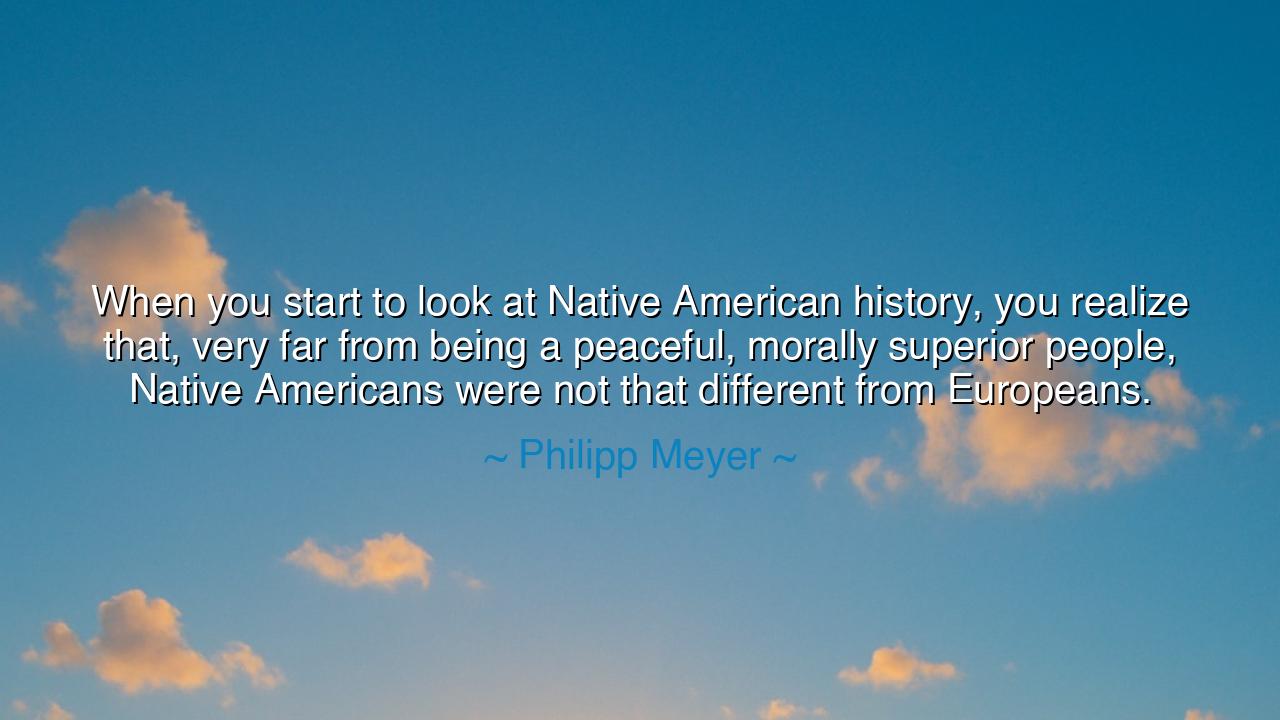
When you start to look at Native American history, you realize
When you start to look at Native American history, you realize that, very far from being a peaceful, morally superior people, Native Americans were not that different from Europeans.






“When you start to look at Native American history, you realize that, very far from being a peaceful, morally superior people, Native Americans were not that different from Europeans.” Thus spoke Philipp Meyer, the author and chronicler of the American frontier, whose words seek not to diminish the dignity of the past, but to restore its truth. In this statement lies not condemnation, but revelation—a call to see history as it was, not as we wish it to be. For Meyer reminds us that no civilization, no people, no tribe is untouched by the complexity of human nature, that the story of mankind is not written in purity or villainy, but in the mingling of both.
In the modern age, we are often tempted to paint history in the colors of simplicity—to make heroes of the oppressed and villains of the conquerors. Yet Meyer, like the wise historians of old, urges us to look deeper. The Native Americans, long mythologized as noble and pure, lived as all people do—capable of beauty and brutality, of generosity and war. They hunted and traded, yes, but they also fought, enslaved, and conquered. Their nations rose and fell through the same forces that shaped Europe, Asia, and Africa: ambition, survival, and the eternal struggle for land and honor. To deny this truth is not to honor them, but to erase their full humanity.
The ancients understood that wisdom lies in balance. The Greeks spoke of hubris—the arrogance of believing oneself beyond the flaws of others. So too does Meyer warn against this arrogance in how we view history. The Europeans who came to the New World brought disease, conquest, and greed—but they also brought art, faith, and the yearning to build. The Native tribes, too, were creators of culture and destroyers in war. To see either as wholly good or wholly evil is to misunderstand the nature of humankind. For beneath every banner and belief, all people share the same impulses—to love, to protect, to conquer, and to endure.
Consider the story of the Comanche, a people both feared and revered on the American plains. They were unmatched horsemen, fierce defenders of their freedom, and brilliant tacticians. Yet they also waged merciless wars against neighboring tribes, capturing and enslaving their rivals just as European powers did across the ocean. Their empire, built on skill and courage, mirrored the same cycles of conquest that defined Rome, Egypt, and every civilization before them. Meyer, in his great novel The Son, captured this duality not to shame them, but to honor the truth—that greatness and cruelty often walk hand in hand.
There is power in such honesty. When we strip history of its illusions, we do not weaken it; we make it stronger. To see the Native Americans as fully human—neither saints nor savages—is to restore to them their rightful place in the great story of the world. It allows us to understand that morality is not the gift of one people, but the struggle of all. Every culture, in its rise and fall, reveals the same eternal pattern: the striving for life, the hunger for power, the search for meaning. Meyer’s words remind us that to love humanity is not to idealize it, but to accept it in its wholeness.
Yet, let us not misunderstand him. Meyer does not speak to diminish the suffering inflicted upon the Native peoples. He speaks instead to broaden the lens through which we view history. For if we see only innocence and victimhood, we rob them of their agency and strength. The Native nations fought, adapted, negotiated, and endured—they were actors in history, not mere subjects of it. To acknowledge their flaws is to acknowledge their fullness, to grant them the same dignity of complexity that we grant to ourselves.
So let this be the lesson: truth is the highest form of respect. Do not seek to purify the past, for purity is the enemy of wisdom. When you study the rise and fall of peoples, seek not heroes and villains, but the mirror of your own soul. The same passions that built their worlds build ours; the same failings that destroyed them dwell within us still. To learn from history is not to judge it, but to recognize in its vast, imperfect mirror the reflection of humanity itself.
And thus, as Philipp Meyer reminds us, the story of the Native Americans and the Europeans is not the story of good and evil, but of mankind. To understand that truth is to take the first step toward compassion—not the shallow compassion of pity, but the deeper compassion of recognition. For when we see the past clearly, without illusions or excuses, we begin to see ourselves—and only then can we hope to rise above the endless cycles of conquest and sorrow that have bound our species since time began.






AAdministratorAdministrator
Welcome, honored guests. Please leave a comment, we will respond soon